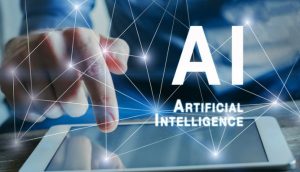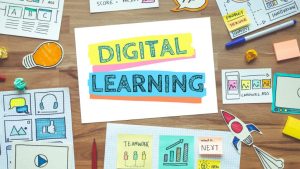AI technology is revolutionizing countless industries and the learning industry is no exception. we will see ways AI and LMS impact on workforce and teams. AI-enabled learning management systems are being used to improve the outcomes of online training with automation and personalization.
But how does the application of AI technology really help with the betterment of training outcomes? We’ll discover the answer to this question in this article.
However, before that, let’s take a moment to understand AI technology and learning management systems (LMS software) in a bit more detail.
What is Artificial Intelligence?
Artificial intelligence (AI), in simple words, is a computer system that is able to carry out specific tasks automatically. The term is commonly used to refer to systems with human-like cognitive processes, including reasoning ability, generalization, or learning from mistakes.
Since the rise of digital technology in the 1940s, it’s been proven that computers can be taught to perform extremely complex jobs with remarkable effectiveness, such as producing justifications for mathematical theories or playing checkers.

Nonetheless, despite continued improvements in computer information processing abilities and memory, there are no systems that can replicate human flexibility across diverse areas or even in tasks that require a great deal of direct experience.
On the other hand, some AI programs have overtaken humans in terms of efficiency in carrying out specific tasks. So, AI systems, in this loose context, can be found performing tasks like medicine assessment and providing search results.
Psychologists often define human intelligence as a composite of several different abilities rather than a single feature. Research in this area has mostly concentrated on the following aspects of intelligence: training, thinking, decision making, perceiving, and communication use.
What is an LMS?
An LMS, or a Learning Management System, is a management software application that offers the ability to store, present, manage, and monitor training material and activity.
While ‘LMS’ is the most commonly used term, alternative terms that may be used include education management program, training engagement management program, or even learner experience platform (LXP).

An LMS is created to make the lives of learning and development professionals easier. For example, an LMS helps with creating and analyzing personal and organizational educational objectives, monitoring performance with reference to specific goals, and accumulating and displaying information for overseeing the learners.
An LMS can be used to manage enrollment, assess skill shortages, and provide relevant material.
Characteristics of an AI LMS integration
The potential of AI technology to develop perception and foresight makes it the ideal addition to an LMS, showcasing the prospect of building an unmatched connection between the online learner and the learning experience.
This leads to the creation of a highly personalized learning process by identifying intellectual, sentimental, interpersonal, behavioral, or public persona elements of the participants. This information can be used to motivate them to learn via a strategic plan that resonates with those personal attributes that are linked to gaining knowledge.
When discussing eLearning and effective learning, it is essential to consider the student’s expectations and perceptions.
With the use of AI in a learning management system, learning about the expectations and perceptions of an online learner can result in the improvement of learning outcomes.
Ways An AI-LMS Integration Can Impact Your Workforce
1. Content that can foresee
Imagine establishing a global LMS and launching massive training programs for your staff only to discover that employees are unsatisfied with the training. Or worse, finding out that they are not finishing their training programs properly. This usually happens when your training materials are not sufficiently interesting.
If your LMS does not offer accessible and interesting eLearning content, the entire point of enrolling in LMS is undermined. The application of AI in LMSs will allow for the customization of educational content based on the user’s preferred way of learning. This can ensure that the employee is more interested and hence, more engaged in the training practice.
2. Digital Learning

Although most LMSs offer a digital employee learning experience, an AI could take this experience to the next level. AI-enabled virtual learning solutions can help learners and learning support engage by imitating voice dialogues or developing visual effects or simulations. This significantly simplifies the effective training process and reduces the need for human intervention.
3. Personalization of the Student Learning
Diverse learners have diverse learning speeds and preferences – some may be slow learners but have good retention rates, others may prefer to go over the subject several times. Others still may enjoy listening to the training material while their peers may prefer to read it. AI facilitates the personalization of learning opportunities, allowing users to complete courses at their own speed and in their own way.
4. Automation
The goal of technology is to minimize human labor while improving outcomes. Consider manually performing duties like enrollment, classification, modules deployment, evaluation, research, monitoring, accreditation, and so on. Now consider an AI controlling everything automatically and autonomously.

Such vast automation can significantly improve the efficiency of any learning and development department. AI-powered automation acts as a support structure, freeing you of routine activities so you can concentrate on more essential matters.
5. Gamification
Gamification is not really a new concept in regard to learning management systems. It has been utilized by many organizations to make teaching more participatory. As a result, it has gained serious popularity during the last ten years. A strategic approach can make gamification more impactful and transparent, further boosting the experience and interest in learning.
The applications of AI can be varied, from revolutionizing the way content is produced to training distribution, learner interaction, individualized learning paths, and computerized reporting. AI can also make the outcomes of gamification better. With automated management of gamification elements like point systems and leaderboards, your L&D team can enjoy the benefits of gamification without having to put in the work.
Conclusion
Here we come to the conclusion about how the invention of artificial intelligence has had such a wavering impact on the learning management systems and how it continues to enhance learner and user experience. If you really want to grow your business, an AI integration with your LMS can prove to be an excellent choice.



































